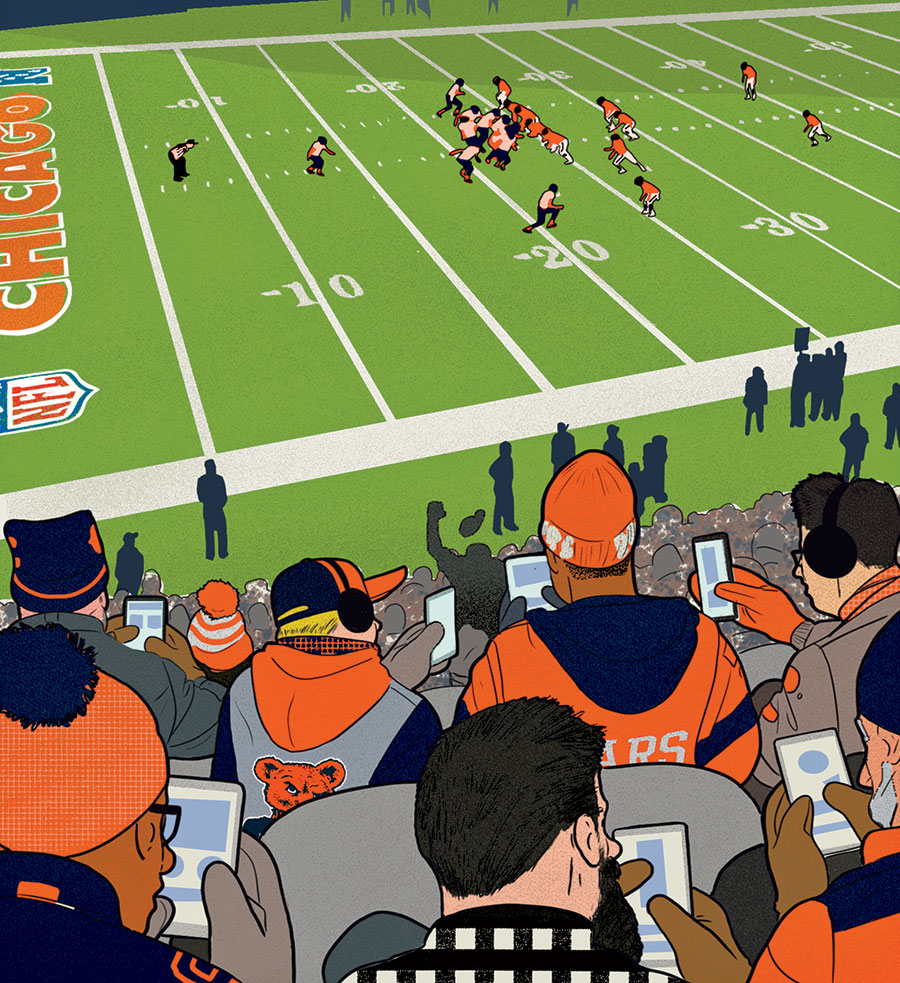Every Saturday at 8 a.m., Joe Ostrowski is on the radio, chatting with oddsmakers, gaming gurus, and other sports experts seeking to connect with or cash in on Illinois’s recently legalized sports betting business. Ostrowski’s Early Odds show on WSCR-AM 670 The Score is just a warm-up act — he talks sports wagering throughout the station’s weekday programs and crews a daily three-hour show on BetQL, a digital radio channel dedicated to sports gambling.
“I didn’t set out for sports betting to become my niche,” says Ostrowski. “But the interest is clearly there. People who never made sports bets before are doing it now.”
The wagering has been going gangbusters since Governor J.B. Pritzker signed a gambling expansion bill that last year legalized sports betting on professional and selected college sports: more than $5 billion in wagers for the fiscal year ending in June, according to a report by the Illinois Commission on Government Forecasting and Accountability. That “handle” puts Illinois in hot pursuit of Atlantic City and Las Vegas.
At least four brand-name online sportsbooks — DraftKings, FanDuel, PointsBet, and BetRivers — have converged on the Chicago market. These high-tech bookies showcase odds for games, handle betting action, pay winners, and collect from losers — turning a steady profit margin of 4 to 6 percent. Their take could be higher, but state law prohibits sportsbooks from laying odds on games involving Illinois college teams.
To win over bettors, who gaming experts say are primarily tech-sharp young and middle-aged men with cash to burn, sportsbooks are spending millions on advertising, phone apps, and gambling incentives, such as cash bonuses for new players.
Gary Kalina, a 49-year-old area risk management consultant and self-described “casual” sports bettor, has five sportsbook apps on his phone. He wagers up to $40 a couple of times a month. “I look at all five and see what type of odds they place or promos they’re running and then decide,” says Kalina, who years ago sampled legal offshore sportsbooks but found them unreliable.
The sportsbooks’ biggest play: partnerships with the Chicago area’s professional sports teams, racetrack, and casinos.
Professional sports leagues long eschewed betting, fearing it hurt the integrity of their games and provoked such unsavory national embarrassments as the notorious Black Sox scandal, in which eight members of the White Sox were accused of throwing the 1919 World Series for a gambling syndicate. Yet the moneymaking potential of sports betting is changing the leagues’ hearts and minds.
The Cubs inked a multiyear, $100 million pact with Boston-based DraftKings to build an interactive, year-round retail betting parlor, scheduled to open by the end of 2022, on the southeast corner of the hallowed Wrigley Field site.
Meanwhile, the Bears are stirring up fans with a long-term agreement that makes BetRivers, owned by Des Plaines–based Rivers Casino, its exclusive sportsbook and casino sponsor, with in-stadium signage and advertising on the team’s app. The fact that Churchill Downs has ownership stakes in BetRivers, Rivers Casino, and Arlington Park, which is up for sale, is sparking speculation this is a first step toward enticing the Bears to bolt Soldier Field and build a larger, modern stadium on the track’s Arlington Heights site.
While Arlington appears to be getting out of horse racing — it did not book any racing dates for next year — Stickney’s Hawthorne Race Course is investing $400 million to become a year-round “racino,” offering live and simulcast horse racing, casino slots, and table games. A sportsbook backed by Australia-based PointsBet is already up and running.
Hawthorne and the state’s 10 casinos, which are also getting into sports betting courtesy of the new state law, are laying odds such partnerships will lure young adult bettors into their sites, which are largely frequented by older folks. “For us, first and foremost is horse racing,” says Jim Miller, Hawthorne’s spokesman and racing analyst. “Once you get bettors in the door, you want to get crossover wagering.”
But online sportsbooks are adept at keeping gamblers to themselves. For instance, each offers a first-bet bonus, some up to $2,000 — more than the casinos offer newbies. If you win, you get the money. If you lose, the money is credited to a future bet, encouraging users to stick around and gamble more. “The fine print says it’s in the form of a credit account. The house is playing with its own money,” says Cory Aronovitz of the Casino Law Group, which specializes in gaming regulations.
Governor Pritzker is counting on the success of sports betting to fund his new infrastructure program, financing the rebuilding of streets, bridges, highways, and more. While the $5 billion handle is impressive, about $4.7 billion of that sum is paid out to winners, leaving adjusted gross receipts of $380 million. Those are taxed at a flat 15 percent rate, generating $57 million for state coffers, a sum that could soon double, according to state estimates. Other gaming tax revenue primarily goes into capital projects and education funds.
None of this sways Illinois’s gambling opponents, who abhor apps that encourage young adults to bet on live sporting events — often play by play. “It’s normalizing gambling and desensitizing them to its dangers,” says Les Bernal of Stop Predatory Gambling.
Still, as the Score’s Ostrowski notes, online sports betting is legal in more than a dozen states, with more to come. Each wants a piece of a jackpot soon expected to hit $81 billion a year nationwide.



